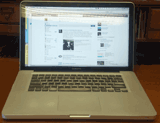 As the online media manger, much of my day is spent online. As a publication, we share new stories with those interested in dairy cattle. However, as an individual, you need to be careful of what you share and with whom. People can learn a lot about you without doing a lot of digging.
As the online media manger, much of my day is spent online. As a publication, we share new stories with those interested in dairy cattle. However, as an individual, you need to be careful of what you share and with whom. People can learn a lot about you without doing a lot of digging.Consumer Reports states that issues with privacy are on the rise. Who is looking at your Facebook page or Twitter profile? We would be naïve to believe only our friends and family are interested in our activities. Criminals are often lurking for information that you inadvertently provide such as your birthdate or your travel plans. How often does a security question for banking or credit cards ask for your birthdate or mother's maiden name? If you are a female who uses her maiden name on Facebook to be more recognizable to high school friends, be careful, that information can be used against you. Indicating your family connections, gives a good indication of maiden names, too. For adult, employers, lawyers and private investigators can view your activities if your settings are not as stringent as they could be. Whatever the reason, think about the information you make available to those on the web.
Your posted activities and discussion can share…
- Health details that your insurance company may be interested to know.
- Your travel plans. If you are in not at home, your house becomes a target for thieves.
- Your birthday, which can give identity thieves a key piece of information.
For students applying for internships or scholarships, potential employers or scholarship evaluators can see the activities of the applicant on their Facebook pages. Over 2.6 million Facebook users discussed recreational use of alcohol on their wall, and if they are under age, it alerts others that this individual does not obey the law. What kind of employee would they be when company rules are outlined?
If you're supposed to be home sick and you check-in at Wrigley Field on Foursquare, or when you told your employer there was a family emergency and you post photos from your skiing adventure that afternoon, your deception will catch up with you because of social media.
Liking pages which may offend others may not seem like a big deal, but affiliations with subjective behavior is not in your best interest if you are looking for a job or a scholarship. Commenting on pages with inappropriate language on Facebook or via Twitter speaks volumes as to your level of maturity.
If you serve as an officer in an organization or are royalty for a breed association, you are a reflection of the organization. Does your online behavior truly reflect the values and beliefs of those you represent? Who knows who is watching you. Set your privacy controls to keep strangers from seeing your posts, or better yet, think before you post.








